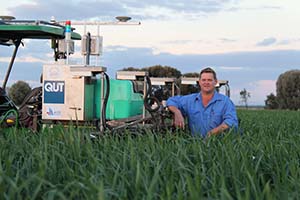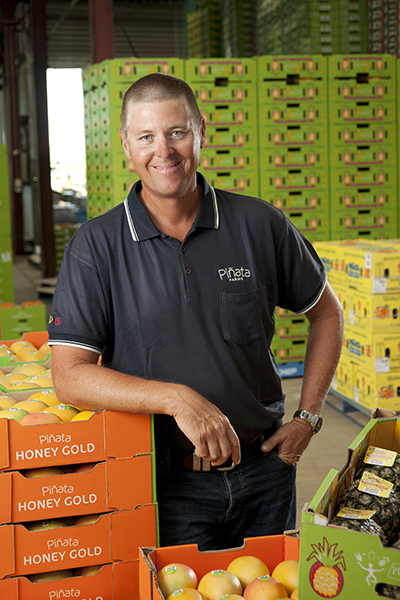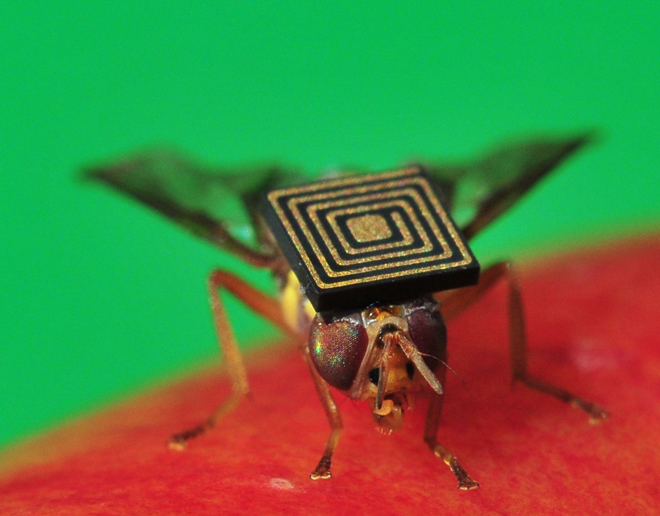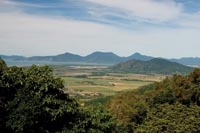AGRICULTURAL ROBOTS are being developed in a very unexpected way in Australia through a collaboration between Swarm Farm and the Queensland University of Technology (QUT). ‘Agbots’ are not too far away from the paddock.
Agbots happen to be a new field of endeavour for Central Queensland farmer Andrew Bate, who has been working in collaboration with QUT and the Australian Centre for Field Robotics to develop robots as, he said, “an enabling technology to do things farmers could not do before”. 
The agbot future, as Mr Bate envisions it, involves swarms of small task-specific robots managing vital processes in ways that humans cannot. Mr Bate’s agbot development company, SwarmFarm Robotics, illustrates his vision – swarms of agbots conducting plant and soil maintenance and improvement tasks such as bug and weed removal, at any hour of the day or night and in any weather conditions – superseding current chemical treatment systems.
Mr Bate said the ‘big’ automation programs for Australian farmers had gone about as far as they could go, with ploughing, planting and harvesting systems now so big that they created a range of counterproductive problems of their own.
In fact, it was while considering how to deal with the deep tracks cut across his land from these massive systems that Mr Bate began to contemplate better solutions through agbots.
FINDING A BETTER WAY
The traditional methods for boosting production, such as chemical treatments and doing everything on an ever-larger scale, were not cutting it anymore, Mr Bate said. He said Australia, because of its previous herbicide use, now had the “unenviable record” of having the second highest number of herbicide resistant weed species of any country.
“The cost (of extra herbicide use) to Australia’s grain industry alone is estimated to be $200 million a year,” Mr Bate said. “The technology that pushed agriculture for the past 20 years has plateaued. Along the way we have forgotten about slow farming – slow, accurate, precise – we have been dining out on a fast food burn.
“Thinking about this was how I got onto the world of agriculture, robotics and collaborations,” he said.
Mr Bate often illustrates his point by citing the 300 horsepower, 36m wide spraying machine used on his family’s Bendee Farm that got him thinking about “a better way” in the first place. He lamented that in every second of its operation that machine was passing over 28,000 individual plants.
“All equipment like this is the same,” he said. “You are dealing with wheel widths and there are limits caused by the compaction of the soil and the destruction of crop that results,” Mr Bate said.
“Up until now, more efficient has meant larger and larger, but it’s wrecking the crop production. I’m convinced that every time we go bigger we go backwards.”
Mr Bate began developing a plan for swarms of small robots which could, if necessary, operate on an individual plant improvement basis. He felt the capability to do this was the Holy Grail of farm productivity and long-term sustainability.
“We want to slow down, assess every individual plant and tend to its exact needs on a plant-by-plant basis,” Mr Bate said. “This may mean applying fertiliser or fungicide only to plants that really need it, rather than applying treatment to entire areas of the field.
“Small robots also reduce the soil compaction (of current large machinery). We are talking about machines that weigh a couple of hundred kilos rather than a 21 tonne spray rig.”
AUSTRALIA HAS AGBOT ADVANTAGE
Mr Bate embarked on a global search for such technologies, focusing on the United States where, he figured, there must be developments that could be brought back to Australia and adapted.
Most of that research turned out to be directed at military and mining applications, not agribusiness.
On his return home he instead met with Hugh Durant-White from the Australian Centre for Field Robotics – now chief executive of NICTA – who introduced him to a fledgling program at QUT in Brisbane, which was set to lead the world in agricultural robotics development.
Mr Bate’s swarm robotics system could form the experiential cornerstone of new QUT research area, headed by Peter Corke, it was realised, and an Australian Research Centre grant was successfully sought.
Mr Bate said robotics had the potential to dramatically improve the way Australia produced food, from managing microbiology in the soil through to how sunlight is absorbed into plant leaves.
“This is pull research, not push research,” Mr Bate said, describing his own family farming business as always being “an early adopter” of new technologies. The difference this time was that he was determined to fit the new technology to meet the farming problem, rather than the other way around.
“From the earliest days of industrialisation in agriculture, farmers have talked about the Holy Grail of farming – the driverless tractor,” Mr Bate said. “But in the modern world of agribusiness, the concept of a driverless tractor is already obsolete.”
He was also not overly enthusiastic about drone technologies, which was what many people associated with future farm automation.
“What are we going to use them for?” Mr Bate said. “Precision farming or ‘precision ag’ has been around for more than 20 years. The idea was that we could collect all this crop data and use it to better manage areas of our paddock. Big data may be a new thing in business, but we got it 20 years ago. We have been collecting data – crop yield, grain protein, near infra red images, satellite images, EM (electron microscope) scans – all sorts of data. Most farmers have got hard drives full of this stuff. Lots of pretty maps, but very few are using it for anything useful.
“Pretty much any data that we can get from drones we can already get from a piloted plane at a competitive cost. A thousand dollars will buy a lot of flight time in a piloted aircraft to collect whatever data you want, but few farmers are willing to do this. Still, everyone is excited by drones to collect more data that no-one seems to be bothered to use at the moment.
“More data doesn’t equal more productivity – we already have information overload.”
ULTIMATE PRECISION FARMING
Mr Bate was more concerned with the direct application of robots to precision tasks.
“What can we do with robots to increase yield, efficiency and improve the environmental impact of farming? The first thing people tend to say to me is that robots will save us so much on wages – but I don’t think so,” he said.
“We already have the labour saving devices now – they are the 36m spray rigs, the 60m planters … It’s getting pretty lonely on the farm – we only have about one person per 5000 acres now, and I don’t think we can do with any less people.”
Instead, Mr Bate said, his research of robotics for agriculture pointed towards agbots that were small, simple, inexpensive with very few moving parts and robust electronic systems. These agbots are all about helping farmers, big or small, to boost production and quality, he said.
SwarmFarm agbots are small, simple machines that do simple tasks very well. They are at a cost level accessible to all farmers and are able to be adapted to local conditions – plus, importantly, they are scalable.
“While governments in developing nations are eager to become self-sufficient, or at least produce as much food as they can, other nations are becoming more concerned about sustainability, environmental impact and the quality and health of the food they are consuming,” Mr Bate said.
“A potato farmer in Russia will want to have robots perform different tasks to a potato farmer in Victoria.”
He described a new microwave technology developed at the University of Melbourne that can be used to kill weeks accurately and efficiently. This is the kind of technology that SwarmFarm agbots could utilise, identifying weeds, ‘frying’ them, then moving on to the next one. Suitably powered, such robots could spend their entire time in the paddock.
“Even more exciting, I think, are the ideas that we have not even thought of yet – ideas that we will start having when they are out in the field and people start thinking more laterally about applications for robots,” Mr Bate said.
Mr Bate and his SwarmFarm team have been working with two QUT PhD students, Patrick Ross and Andrew English, along with project leader Dr David Ball. The project is also partnered with the Australian Centre for Field Robotics with Dr David Fysh and PhD student Tom Patten.
While most of the early work centred on object avoidance systems and swarm techniques, progress has been rapid and the project is just months away from releasing model prototypes. Mr Bate is eager to see Queensland lead the world in swarm farming agbots.
“Robots will give us increased yields, increased efficiencies and better environmental outcomes. Simple.”
www.swarmfarm.com.au
http://192.185.196.109/~swarmfar/
www.qut.edu.au
ends


 How to resolve AdBlock issue?
How to resolve AdBlock issue? 

